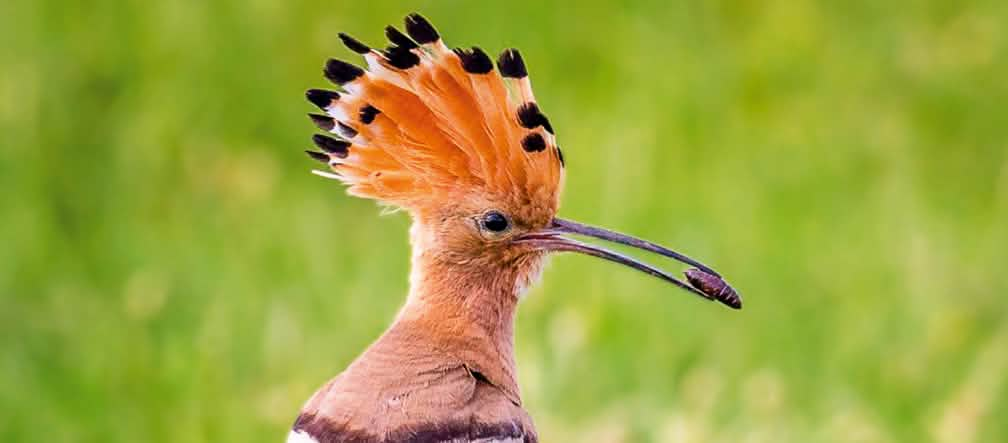
Hands off the EU’s environmental laws!
The European Commission plans to weaken laws designed to protect the environment – both at home and worldwide. Details will be announced in the fall through an “Omnibus package.” The Commission is currently gathering feedback from the public to learn what people think. Get involved and make your voice heard!
News and updatesTo: President of the European Commission Ursula von der Leyen, European Commission, Members of the European Parliament, governments of EU member states
“The laws that protect the environment and nature in the EU are more important than ever. They must not be weakened – they need to be strengthened and improved.”Thanks to stricter laws and oversight, many environmental indicators in Europe have improved in recent decades. The air is cleaner in many places, industrial emissions have fallen, and the water is less polluted.
But this is not enough, as nature across Europe and worldwide continues to decline – only 15 percent of habitats in the EU are in good condition. This is seen most clearly in the loss of animal and plant species.
Over the past 45 years, a quarter of Europe’s bird population has been lost – that’s 500 million fewer birds in the sky than in 1980. Butterfly numbers have dropped by a third, and one in ten wild bee species is disappearing. Two fifths of European tree species are threatened. Worldwide, 28 percent of assessed species are at risk of extinction.
There is obviously urgent need for action. Yet, rather than stepping up efforts and strengthening laws to protect the environment and nature, the European Commission wants to reverse progress and “simplify” the rules.
The EU pesticide regulation that had previously been agreed was withdrawn in 2024 due to a backlash from agribusiness and right-wing groups. Now, the EU wants to ease corporate reporting and due diligence rules to “regain competitiveness and unleash growth.”
This fall, the European Commission intends to present an “Omnibus package” in response to intense lobbying to cut back the laws that form the very foundation of nature conservation. This includes the EU Habitats Directive and EU Regulation on Deforestation-free Products (EUDR).
The EU is now inviting all citizens to share their views in a public consultation.
Please say NO and sign our petition:
EU consultation on environmental protection
On July 22, 2025, the European Commission launched a public consultation process on future simplification of environmental regulations. Until September 10, anyone can easily submit comments and statements. Here is the portal for comments.
Please speak out AGAINST “simplifying” environmental laws! There are many reasons for this, as the ever-worsening state of nature and the environment, declining ecosystems, loss of biodiversity and the rapidly advancing global climate crisis demonstrate vividly.
State of nature in Europe
The EU writes about the state of nature in Europe: “Despite these efforts, the state of the EU’s nature is in severe decline. … The most recent assessment by the European Environment Agency from 2020 paints an alarming picture of the EU’s nature, in particular habitats which are home to all kinds of animals and plants. Only 15% of habitats are in good condition. …
The situation is worsening. Of the EU habitats and species in a poor or bad state, over one third is further deteriorating. Only 9% of habitats and 6% of species in a poor or bad state show an upward trend. …
As a consequence bees and butterflies, which are among the most common pollinators, are in very poor condition in the EU.
1 in 3 bee and butterfly species are in decline
1 in 10 are on the verge of extinction
Almost 30% of grassland butterflies have been lost since 1991.
…
36% drop in farmland birds since 1990
…
The population of common birds in the EU decreased dramatically between 1990 and 2021.” That is the EU Council of Ministers, verbatim.
Dramatic losses among insects
The situation for insects is especially dire. Over 40 percent of insect species are considered threatened, extremely rare, missing, or already extinct. Even more dramatic are the population declines – decreases of up to 80 percent are not unusual, according to the German Environment Ministry.
Insects may sometimes be a nuisance, but in nature they serve vital roles. They pollinate flowers, break down plant and animal matter, maintain soil fertility and provide food for a vast number of other animals – especially numerous bird species.
Warning from the European Central Bank
Even the European Central Bank (ECB) warns against weakening European laws that protect nature and the environment. Its president, Christine Lagarde, writes that weakening European sustainability laws like the Corporate Sustainability Reporting Directive (CSRD) and Corporate Sustainability Due Diligence Directive (CSDDD) could threaten the financial stability of the Eurosystem.
The ECB relies on accurate sustainability information to assess climate-related risks to the economy and implement monetary policy effectively. Planned reductions in reporting and due diligence requirements would seriously undermine the ECB’s ability to identify and manage risks.
Wildfires in Europe
This year alone, one million hectares of forests and timber plantations have burned in the EU – including protected areas. The fires have released 35 million metric tons of CO2.
To: President of the European Commission Ursula von der Leyen, European Commission, Members of the European Parliament, governments of EU member states
Dear President von der Leyen, Ladies and Gentlemen,
I am deeply concerned about the attempts of the European Commission, the European Parliament, and the governments of the EU member states to weaken and roll back Europe’s environmental and nature protection laws.
Our health and future depend on a clean environment and a thriving natural world. Legal protections are not a burden – they are essential. We and future generations need clean air and water, safe food, and healthy ecosystems.
EU environmental legislation has already played a key role in improving air and water quality across Europe. But much remains to be done. The loss of nature and habitats, the alarming decline in biodiversity, and the climate crisis must be tackled as a matter of urgency.
I therefore call on the EU to focus on fully implementing the laws designed to protect and restore nature, water, and air.
The world’s forests must be safeguarded. As a consumer, I do not want to buy products linked to global deforestation. Regulations such as the EU Regulation on Deforestation-free Products (EUDR) are crucial and must now be enforced. Industry has had three years to prepare.
The wellbeing of our planet and of future generations outweighs the narrow economic interests of a few.
Yours faithfully,
European Council, 2025. What is the state of nature in the EU?
https://www.consilium.europa.eu/en/infographics/state-of-eu-nature/#0
Rigal, S. et.al., May 15, 2023. Farmland practices are driving bird population decline across Europe:
International Union for Conservation of Nature, September 27, 2019. Over half of Europe’s endemic trees face extinction:
https://iucn.org/news/species/201909/over-half-europes-endemic-trees-face-extinction
International Union for Conservation of Nature, 2025. The Red List of threatened species:
Corporate Sustainability Reporting Directive (CSRD), and the Corporate Sustainability Due Diligence Directive (CSDDD).
See: European Commission, February 26, 2025. Commission proposes to cut red tape and simplify business environment: https://commission.europa.eu/news-and-media/news/commission-proposes-cut-red-tape-and-simplify-business-environment-2025-02-26_en
European Commission, July 22, 2025. Commission invites feedback on future environmental legislation simplification: https://environment.ec.europa.eu/news/feedback-request-simplification-environmental-legislation-2025-07-22_en?prefLang=de
European Council, 2025. What is the state of nature in the EU? https://www.consilium.europa.eu/en/infographics/state-of-eu-nature/#0
Bundesministerium für Umwelt, Klimaschutz, Naturschutz und nukleare Sicherheit (BMUKN), July 5, 2023. Welches Ausmaß hat der Insektenrückgang?: https://www.bundesumweltministerium.de/faq/welches-ausmass-hat-der-insektenrueckgang
- - European Central Bank (ECB), August 15, 2025. Reply to Members of the European Parliament: https://www.ecb.europa.eu/pub/pdf/other/ecb.mepletter250815_Eickhout_Gerbrandy_Pietikainen_Saramo_Wolters~25dd21fe84.en.pdf?5abe812799d70e8654bd6274960ec769
- - European Central Bank (ECB), May 8, 2025. OPINION OF THE EUROPEAN CENTRAL BANK on proposals for amendments to corporate sustainability reporting and due diligence requirements (CON/2025/10): https://www.ecb.europa.eu/pub/pdf/legal/ecb.leg_con_2025_10.en.pdf
